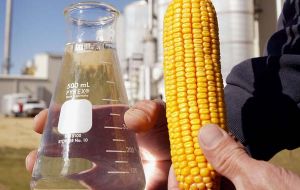MercoPress. South Atlantic News Agency
OECD joins global bio-fuels and “food vs fuel” debate
 Energy crops blame for record grain prices
Energy crops blame for record grain prices A report on the impact of bio-fuels suggests that bio-fuels championed for reducing energy reliance, boosting farm revenues and helping fight climate change, may in fact hurt the environment and push up food prices.
The bio-fuels controversy is rapidly becoming a global "food vs fuel" debate as cereal and oil seed prices skyrocket and more land is dedicated to energy-producing crops. The Organisation for Economic Cooperation and Development (OECD) report states that bio-fuels may in fact "offer a cure that is worse than the disease they seek to heal". 'The current push to expand the use of bio-fuels is creating unsustainable tensions that will disrupt markets without generating significant environmental benefits", argues the OECD. "When acidification, fertilizer use, biodiversity loss and toxicity of agricultural pesticides are taken into account, the overall environmental impacts of ethanol and bio-diesel can very easily exceed those of petrol and mineral diesel". OECD therefore calls on governments to cut their subsidies for the sector and instead encourage research into technologies that would avoid competing for land use with food production. OECD says tax incentives put in place in many regions, including the European Union and the United States, to encourage bio-fuel output could be hiding other objectives. "Biofuels policies may appear to be an easy way to support domestic agriculture against the backdrop of international negotiations to liberalize agricultural trade" points out OECD adding that instead it is encouraging members of the World Trade Organisation to step up efforts to lower barriers to bio-fuel imports to allow developing countries that have ecological and climate systems more suited to biomass production. OECD also encouraged governments to work on cutting demand for transport fuel rather than encouraging production of so-called "green fuels". "A liter of gasoline or diesel conserved because a person walks, rides a bicycles, carpools or tunes up his or her vehicle's engine more often is a full liter of gasoline or diesel saved at a much lower cost to the economy than subsidizing inefficient new sources of supply", points out the report. Bio-fuels, made mainly from grains, oilseeds and sugar, claim some Third World leaders are responsible for a recent surge in farm commodities prices, along with other factors such as lower output and tight stocks which threaten the subsistence of millions of poor people. OECD which in July forecasted that bio-fuels keeping prices at high levels into the next decade, said it would lead to the unavoidable "food-versus-fuel" debate. "Any diversion of land from food or feed production to production of energy biomass will influence food prices from the start, as both compete for the same input", underlines OECD. The debate has also engulfed and divided the United Nations Food and Agriculture Organization, FAO, with some of the experts, in private, saying that the name of the organization should be changed from "FAO to Toyota" (the world's leading car manufacturer).




Top Comments
Disclaimer & comment rulesCommenting for this story is now closed.
If you have a Facebook account, become a fan and comment on our Facebook Page!